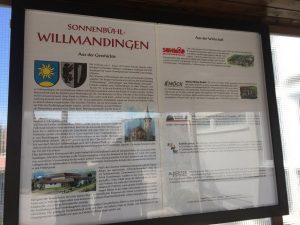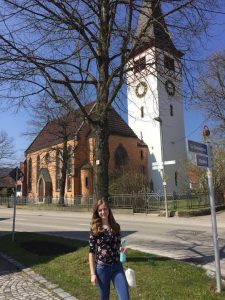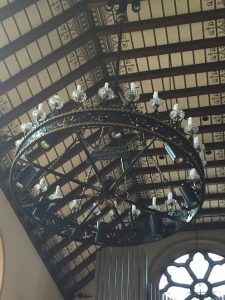Blogger: Alyson Kneusel
Program: Reutlingen, Germany – Study Center
When asked why I had chosen to apply for the Reutlingen, Germany study abroad program, I was able to think of numerous good responses. One reason was that my family was ancestrally from Germany, so that was a big allure to me. When I came here, I never expected to have a direct connection with my heritage; I was just hoping to learn about the culture and history so that I could better understand where I came from. I never imagined that I would actually find the town from which my great-great-grandfather moved to America, and that it would be only 25 minutes away from where I had spent my study abroad experience.
From the Hauptbahnhof Obf stop in Reutlingen you can take a 25 minute bus ride to the town of Willmandingen, Sonnenbühl. Willmandingen is just one of many very small German towns in this region of Germany. Yet to me, it is a town that is still full of “Möck” family relatives (Möck is my great grandmother’s last name). Following my arrival in Reutlingen, my great aunt messaged me saying that we still had distant relatives in a town nearby me. After she asked around the family, I found out that my great great grandfather’s family had lived there before my great great grandfather came to America. In fact, he was living in that town when he was sent to America to live with his uncle there (as the family had too many children to support). That is the origin of my family line in America.
Of course, I had to go and see this town. When my mother visited, we hopped on the bus and traveled there. We found the house where my relatives still live. We decided not to bother them (as they speak very little English and we speak very little German) but we had heard that the local Protestant church still stood in the area. Sure enough, on a rock standing outside the church we found many “Möck” family names. However, the church seemed to be locked so we thought we wouldn’t be able to get in.
Just as we started to leave we ran into a man coming to drop off a ladder inside the church, and he asked us if we needed to get into the church. We said yes and attempted to explain the reason we were there. It turns out that this man was actually also a “Möck,” and more than that, he is the cousin of our remaining relatives in the town. He mentioned that he actually translates the English mail they get for them…we believe this mail is my grandparent’s Christmas cards that they send each year.
When we were walking around the church, he was telling us some of the things he knew about the church’s history. One story he told was about the chandelier in the church, which he said was funded with money sent back from a Möck living on a farm in the United States. We looked at the sign, and sure enough, the name on it was the name of the uncle my great great grandfather was living with in the USA! He sent back money for the church and his family after moving to America and funded this chandelier that I had now ended up finding while I was coincidentally studying nearby in Germany more than 100 years later.
It was almost as though this small piece of my family history had remained unchanged all these years. As the American branch of the family distributed all over the United States, many members of the Möck family seem to have remained in this small German town. Although I have no clue how distant the relationship with many of these people is, it was strange to find a cemetery full of Möck graves, a business called Möck, and a small sign all about the history of the town. It was more than I could’ve imagined happening upon so close to my home in Germany. It is strange to think that after more than 100 years a descendent of the “Möck,” who went on the long move to the USA, would end up calling the region home again, even if just for a short time.
Liebe Grüβe,
Alyson Kneusel



Leave a Reply